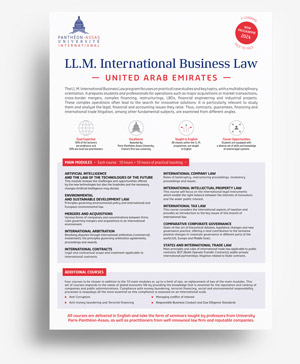LL.M. International Business Law
Overview
Whether in Dubai, Paris, Mauritius or Singapore, all courses are taught in English, by Professors of Law from Paris Panthéon-Assas University and professionals acting in the legal field coming from France, Europe, Asia and Africa. All courses strongly focus on case-studies and deepening of key subjects in a transversal and pluridisciplinary perspective.
The LL.M. International Business Law includes a minimum of 200 hours of teaching and welcomes approximately 30 students or trainees over a period of one academic year.
The LL.M. International Business Law program focuses on practical case studies and key topics, with a multidisciplinary orientation. It prepares students and professionals for operations such as major acquisitions or market transactions, cross-border mergers, complex financing, restructurings, LBOs, financial engineering and industrial projects. These complex operations often lead to the search for innovative solutions. It is particularly relevant to study them and analyze the legal, financial and accounting issues they raise. Thus, contracts, guarantees, financing and international trade litigation, among other fundamental subjects, are examined from different angles.
| Senior Leadership: | Guillaume Leyte and Nada Mourtada (Professors) |
| Programme name: | LL.M. International Business Law |
| Degree type: | institutional degree (diplôme d’université) |
| Awarding body: | degree is awarded by Paris-Panthéon-Assas University |
| Level: | graduate (Bac +5 level) |
| Duration: | 1 year |
| Study method: | Face-to-face (e-learning if needed) |
| Intake: | January |
| Location: | DIFC Academy in Dubai |
Teaching & Structure
Main Modules
The LL.M. International Business Law is composed of ten main modules: Artificial intelligence and the law of the technologies of the future, Environmental and sustainable development law, Mergers & Acquisitions, International arbitration, Comparative corporate governance, International contracts, International company law, International intellectual property law, International tax law, and States and international trade law.
Additional courses: Four courses to be chosen in addition to the 10 main modules or, up to a limit of two, as replacement of two of the main modules. This set of courses responds to the needs of global economic life by providing the knowledge that is essential for the reputation and ranking of companies and public administrations. Compliance with money laundering, terrorist financing, social and environmental responsibility processes is nowadays all the more essential as this compliance is assessed on an international scale.
Each module is composed of 10 hours of theoretical teachings and 10 hours of practical teachings.
All courses are delivered in English and take the form of seminars taught by professors from Paris-Panthéon-Assas University, as well as practitioners from law firms and major companies.
Assessment
Examinations will be held for each modules. Some modules might require 2 exams: one regarding the theoretical lecture, and one regarding the practical part of the module.
The method of evaluation is determined by the respective professors/teachers with the approval of the dean.
The method of evaluation may be a written exam, class participation, project presentation, and/or homework assignment.
The format of the exam might vary from one module to another. Here are a few examples:
- Questions with multiple answers
- Individual work cases (essays) to be done at home
- Assignments or presentations to be prepared in groups
- Evaluation tests at the end of each seminar
Each subject is graded out of 20 and the pass mark is 10/20 for each module. The student is admitted if he/she has obtained at least a total of 100 points out of 200 and 60 ECTS credits will be awarded. Results will be communicated at the end of the course, in December, followed by a graduation ceremony. There is no exam period, since the examinations are held during or at the end of a module.
Grading system
- Average grades from 10 to 12 (out of 20): Pass (Passable)
- Average grades from 13 to 14 Good (Assez Bien)
- Average grades from 15 to 16 Very Good (Bien)
- Average grades from 17 + Honors or Excellent (Très Bien)
Structure
The course runs from January to December. All courses are delivered through evening classes or week-end classes. All participants must be available on a full-time basis. Indeed, the schedule is always subject to modifications, and no absence will be excused in case of any change in the schedule.
Artificial Intelligence and the Law of the Technologies of the Future
This module reviews the challenges and opportunities offered by the new technologies but also the loopholes and the necessary changes Artificial Intelligence may dictate.
ENVIRONMENTAL AND SUSTAINABLE DEVELOPMENT LAW
Principles governing environmental policy and international and European environmental law.
MERGERS AND ACQUISITIONS
Various forms of companies and concentrations between firms; rules governing mergers and acquisitions in an international environment.
INTERNATIONAL ARBITRATION
Resolving disputes through international arbitration (commercial, investment); the principles governing arbitration agreements, proceedings and awards.
INTERNATIONAL CONTRACTS
Legal and contractual scope and treatment applicable to international contracts.
INTERNATIONAL Company law
Rules of bankruptcy, restructuring proceedings, insolvency proceedings and issues…
International Intellectual property Law
This course will focus on the international legal instruments which enable the right balance between the interests of innovators and the wider public interest.
International Tax Law
This course considers the international aspects of taxation and provides an introduction to the key issues of this branch of international law.
Comparative corporate governance
State-of-the-art of theoretical debates, legislative changes and new governance practice, offering a vital contribution to the tentative positive changes in corporate governance in different parts of the world (US, Europe and Middle East).
STATES AND INTERNATIONAL TRADE LAW
Main principles and rules of international trade law applicable to public contracts: BOT (Build-Operate-Transfer Contracts); public-private international partnerships; litigation related to State contracts.
Additional courses
- Anti Corruption
- Anti money laundering and Terrorist financing
- Managing conflict of interest
- Responsible Business Conduct and Due Diligence Standards
All courses are delivered in English and take the form of seminars taught by professors from University Paris-Panthéon-Assas, as well as practitioners from well renowned law firm and reputable companies.
Entry Requirements
The course is designed for both experienced and qualified professionals with a strong professional background and for motivated candidates who have just completed their degree and who may want to occupy the jobs mentioned above.
The entry requirement of this LL.M. in International Affairs is
- a master’s degree in law or an alternative degree with at least 4 years of professional experience.
- Fluency in the English language is required and must be attested by a recognized certificate such as IELTS (7/9), TOEIC (800/990), TOEFL (90/120), Erasmus courses or of course English mother tongue.
- Candidates are selected and will be assessed on their motivation, their career objectives and their language aptitude.
As the case may be, an interview with the Board of Professors will be organised to ascertain how far the candidate is interested in the LL.M. and its adequacy with his career plan.
Admission process:
Candidates can only apply once per academic year and are required to complete the following steps:
- Submit the Application Form online (application fee of EUR 80).
- Applicants whose applications are accepted will be invited to confirm their admission.
For more information, you can send a request to our Admissions Team.
Tuition Fees & Funding
The LL.M. International Business Law course tuition fees are EUR 40,000 or AED 160,000. Payment of tuition fees are to be paid either in Euros (EUR) or Emirati dirham (AED). It is up to the candidate to choose the most favorable currency at the time of the transaction.
Tuition fees instructions are communicated upon student enrollment. All fees are payable only by Bank transfer to the Paris Panthéon-Assas University, and in all cases, all exchange or transfer charges are to be borne in full by the candidate.
In order to secure your seat in the course at the Dubai campus, a first deposit is requested within 3 weeks following the reception of the admission letter.
If the full amount is not paid by the beginning of the semester, students will not be allowed to attend the classes.
Sponsorship
For more information on payment plan, contact the campus admission’s office
Refund policy
Any admitted applicant who elects to renounce his/her registration is to be aware he/she will not benefit from any reimbursement.
Should a student decide to abandon the course after he/she has begun attending classes, there will be no refund of the tuition fees.
UAE Campus
Presentation brochure
More information and application:
Recruitment team

